610 Search Results for visual support
February 5, 2013
by Robin Parker -
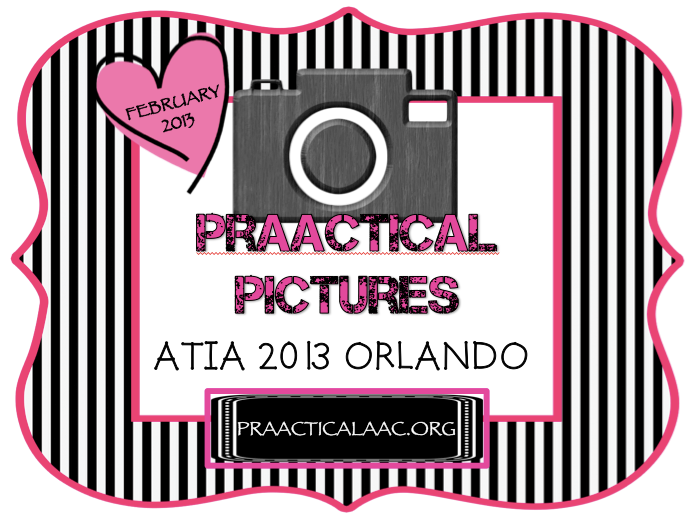
All we can say is Wow! ATIA 2013 Orlando was awesome! Since it is February, we will focus on things we LOVE as it relates to our ATIA experience. Here are just a few thoughts and pictures from our time in the Exhibit Hall. (Please note, this is just a small sample of the many, many things seen and learned. Our list is based on the pictures we took and the time we had in the Exhibit Hall (both limited). A comprehensive list of Exhibitors can be found at the ATIA 2013 Orlando Site under the Exhibit List. So much to see and learn! FRS Custom Solutions.- We loved meeting the FRS Team (especially since they are based in Fort Lauderdale) and learning about the CommLink ProSlate Series. Fat Cat Chat– Love the Fat Cat Chat apps for ‘small talk’ (Thanks Jane Farrall for blogging about Fat Cat Chat apps). Immediately... [Read More...]
January 30, 2013
by Robin Parker -
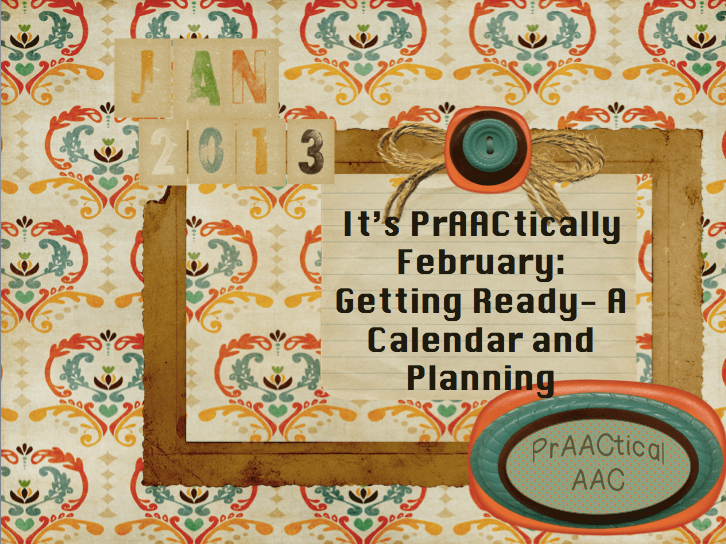
January is (was) a fairly crazy and busy month for us. After a late back to school week, the CARD Conference, the Dan Marino Foundation WalkAbout Autism, and ATIA Conference (hope to see you there), we got a bit of a late start on a few things. To stay ahead of ourselves, we want to end January by being ready for February…… For February, we have a calendar for incorporating AAC into everyday activities (it goes with yesterday’s post 28 things to do). Feel free to print out and share and use anyway you want to promote PrAACtical AAC. A PDF version (free) can be found at our Teachers Pay Teachers site. Our new Strategy of the Month (on Saturday) will focus on Communication & Language Beyond Requesting. There are no pre-requisites to learning and being immersed in ALL of the reasons to communicate (communication functions). For some learners, it... [Read More...]
January 11, 2013
by Carole Zangari -
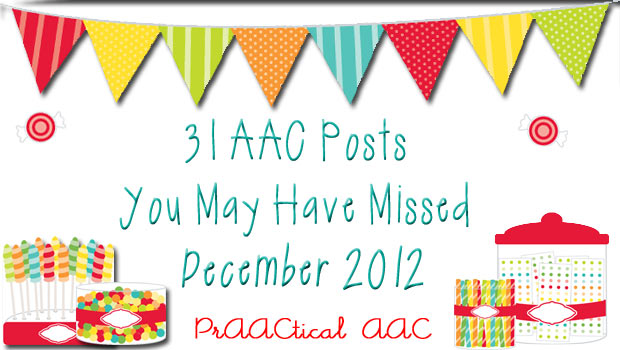
PrAACtically Thinking Happy New Year Let’s Cook: It’s PrAACtically the New Year! 10 Resources for Planning and Designing Communication Books Why We Love AAC Language Experience Activities AAC Vocabulary Instruction Round-Up Beyond Good Intentions: Thoughts on PrAACtical Supports for AAC Families No Words: “We’re Hurting, Too” Quick Start Communication Book Pages Talk About Me, Too: AAC and Visual Strategies for Significant Challenges The PrAACtical Side of Giving: Random AACts of Kindness Hello, Holiday! 10 Great Apps to Gift Do It My Way: Personalizing Communication Books 31 AAC Posts You May Have Missed, November 2012 Why We Love Sequential Message Devices/Apps Strategy of the Month The PrAACtical Power of Communication Books Organizing Vocabulary for Communication Books: Getting Started Communication Books: Making Decisions About Format The Communication Book is Ready: Now What? PrAACtically Personal: Individualizing Communication Books Video of the Week Making Libraries Inclusive Inclusive Libraries, Part 2 Why Use AAC? Why... [Read More...]
January 4, 2013
by Robin Parker -
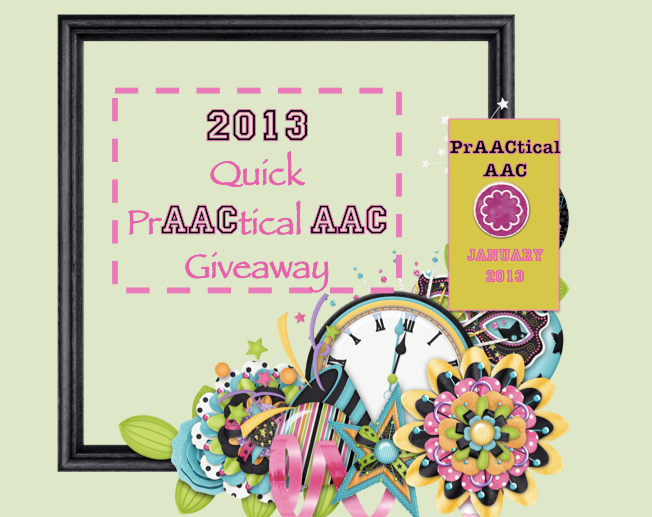
We are so excited for a great 2013 and we have 2 AAC Giveaway Winners! Congratulations! Thank you to everyone who participated and to Therapy Box Apps Scene & Heard- (Scene & Heard) & Enabling Devices/Toys for Special Children #1 Enabling Devices/Toys for Special Children has generously donated a 4-Compartment Scanning Communicator. Please show your appreciation of Enabling Devices by visiting and liking their Facebook page. #2 Scene & Heard- We have one code for the Scene & Heard AAC app that supports multiple languages through voice recordings and supports switch scanning. Scene & Heard takes a visual scene approach to AAC and we are so appreciative to T-Box Apps for donating their app for this giveaway. Don’t forget to show your appreciation by liking their Facebook Page. Enter the Giveaway- How Does It Work? We use Rafflecopter to administer the giveaways. All entries made through there will be counted toward our drawings. Enter now and everyday until... [Read More...]
December 22, 2012
by Robin Parker -
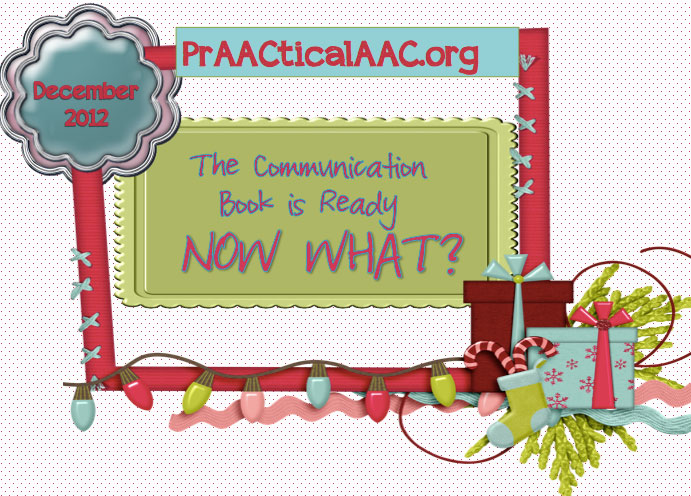
The Communication Book is Ready… Now What? The fun begins…. Yes, we really do think that TEACHING a learner to USE the communication book is FUN. We get to participate in lots of meaningful language experiences, we get to be creative, we get to watch language blossom, and we get to be surprised by the communication competence ALL of our learners show us after prAACtice, prAACtice, and for some more prAACtice . The best way to get started with communication book teaching is to begin by trying out different teaching tips, strategies, and resources and find out what works best. Each communication dyad (communicator & communication partner) is different so the combination of strategies that will work will vary but at the core of the teaching process, there should be fun, motivation, and of course progress. STRATEGIES and CONSIDERATIONS Aided Language Input (ALI)– We can not say enough about... [Read More...]
December 6, 2012
by Robin Parker -
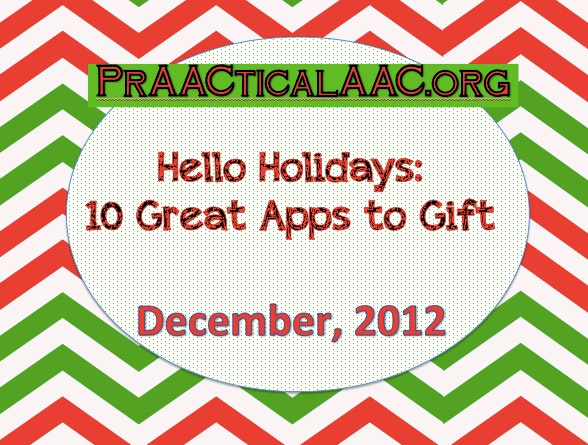
The holidays are prAACtically here and depending upon the holiday traditions you celebrate they may be closer than you realize. Time seems to fly after Thanksgiving and before you know it, social norms seem to dictate gift exchanges, lots of invitations to people’s houses, and of course many gifts for friends and family. An easy way to accomplish gift giving is to ‘gift an app’. You can give apps that are pure fun, educational or a combination of both. To top it off, it is easy to stay within budget, avoid traffic, avoid crowds, and save tons of time (no need to wait for it to arrive). Before you think it’s too complicated, check out these ‘Gifting an App’ instructions by Cult of Mac. The process could not be simpler and you can email the recipient(s) or print out a gift certificate (if necessary right before the gift is needed).... [Read More...]
November 1, 2012
by Carole Zangari -
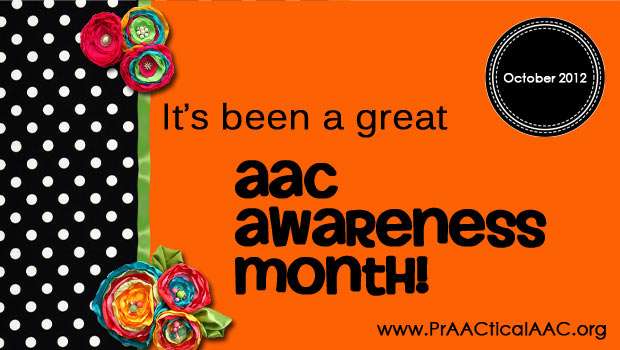
It’s hard to believe that AAC Awareness Month 2012 is over. We are happy to announce the winners of the final drawing. Diane Saunders (#160), Rachel Berry (#12), Claire Rubin (#73), Cassandra Stafford (#726), Carrie Walls (#609), Alison Rumball (#369), Monica Venezia (#309), Tanya Keller Scott (#414), Tea Moore (#393), Christina Frenzel (#179), Hudi Bernstein (#668), Yvette Bardole (#350), Lauren Enders (#241), Juliana Escobar (#500), Caroline Trzaska (#294), Kimberly Hurley (#488), Jane Eikelboom (#189), Amy Vinson Taylor (#771), Lisa Neely (#567), Stacey (#695), Debra Seixas (#451), and Melissa Seldin (#268). We will be in touch later today with the specifics. We are deeply appreciative of the AAC community who furnished the prizes we awarded to 70+ winners. A huge thank you to Ablenet, Inc, Abilipad, Alexicom, Avaz, BeeVisual, Dynavox/Mayer Johnson, Gail Van Tatenhove, PA, Hump Software, iClick iTalk, MarbleSoft, Mozzaz, News-2-You, Paul H. Brookes Publishing Company, RJ Cooper, Safe N... [Read More...]
October 30, 2012
by Carole Zangari -
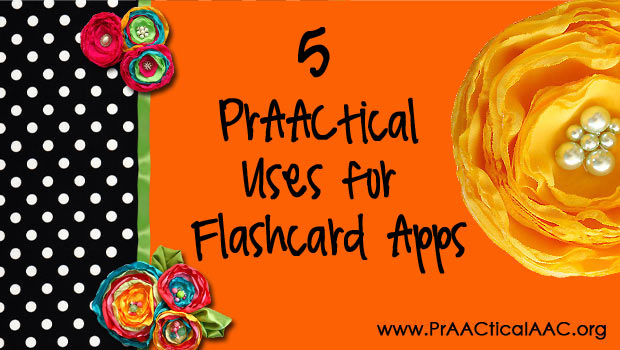
We love AAC intervention that begins and ends with a context that is meaningful to the learner. Not only is contextually relevant therapy more engaging and fun for the learner (thus, easier on the clinician!) but it promotes generalization to real-world contexts. So we’ve never been terribly fond of therapy that uses flash cards, or, more recently, the digital versions on iOS or Android devices. It’s a shame, really. There are a lot of those kinds of apps, and many of them have great graphics. That got us to starting thinking: What could we use them for that improves real communication and AAC learning? PrAACtical Uses for Flashcard Apps Make a Mini Schedule: Lots of people with AAC needs use paper-based picture schedules that depict the activities they do throughout the day. A flashcard app could be used in conjunction with those to show the steps or parts of an... [Read More...]
October 28, 2012
by Carole Zangari -
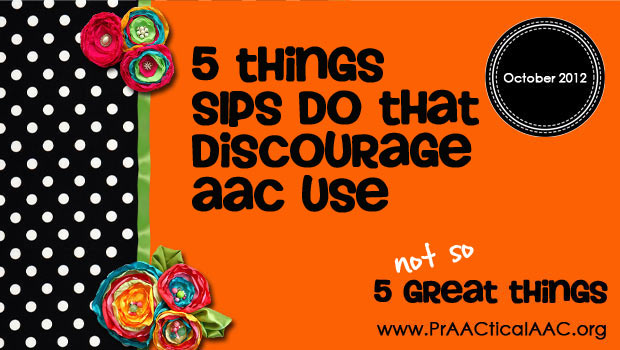
We mean well. We really do. But sometimes the things we say or do, and even the things we DON’T say/do have a negative impact on our long-range goal of improving AAC outcomes. Here are some of the things we’ve observed that can discourage AAC use. Recommending AAC without giving stakeholders a solid, evidence-based rationale creates a shaky foundation. People aren’t going to put forth effort to implement something they don’t believe in, and they won’t believe in it until we make a compelling, well-supported argument. ‘Rules that aren’t understood are the first to be broken.’ It’s easy to forget that, in some ways, the AAC user is learning a whole new language. What would it take US to learn a new language? Well, for starters, we’d want to be immersed into an environment with competent speakers of that language. Hearing the language that we’re trying to learn makes... [Read More...]
October 27, 2012
by Robin Parker -
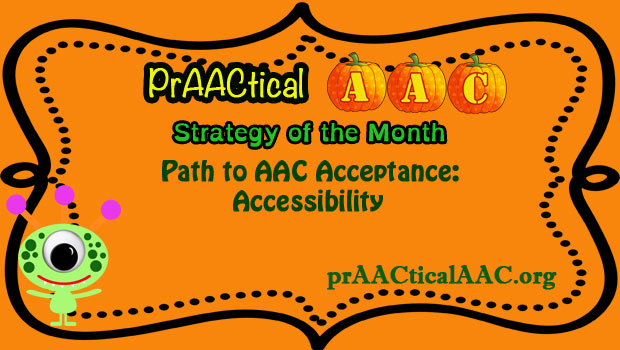
It is AAC Awareness Month and everyone has really been spreading the word and helping to build AAC acceptance. Participation barriers continue to prevent full AAC acceptance. In order to help combat these obstacles it is necessary to talk about them, deconstruct them, and attempt to build solutions. So after going over attitudinal barriers and information barriers, we need to discuss accessibility barriers. It’s a shame that there are so many barriers to making AAC work, but we know that with awareness comes improvement. Barriers of accessibility can be about motor, sensory, cognitive, literacy, or communication/language issues. For this discussion though the focus is on accessing AAC to learn a comprehensive language in ALL modalities (i.e., talking, listening, reading, & writing). The prevention of access to a comprehensive system is usually tied in to assumptions about cognitive and literacy skills. Although it seems that most professionals realiize that there... [Read More...]









